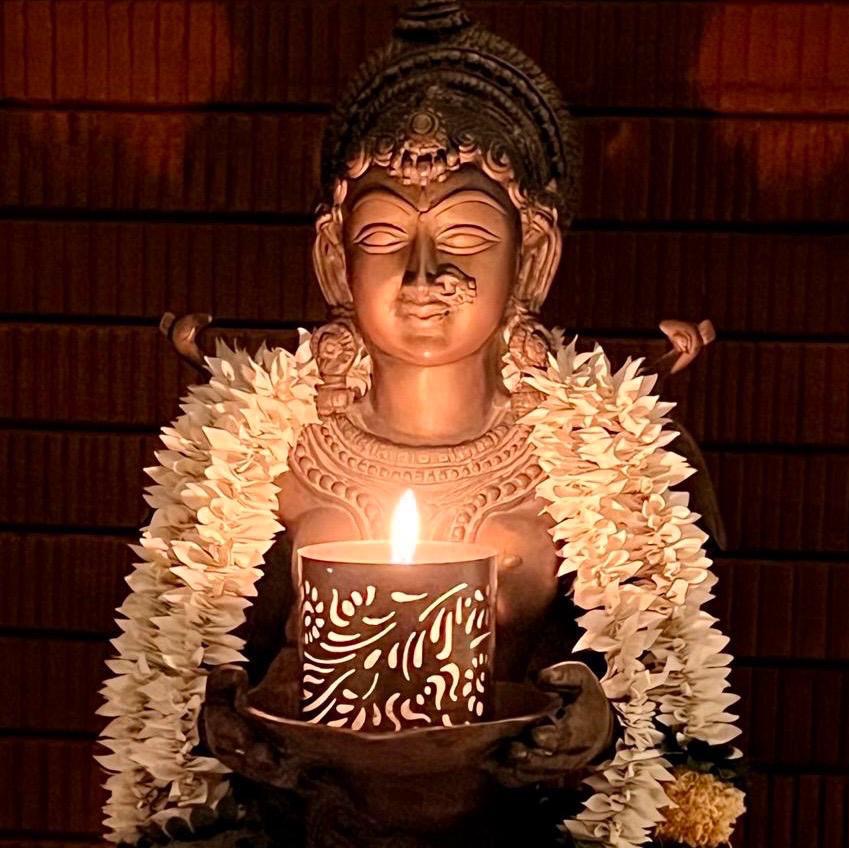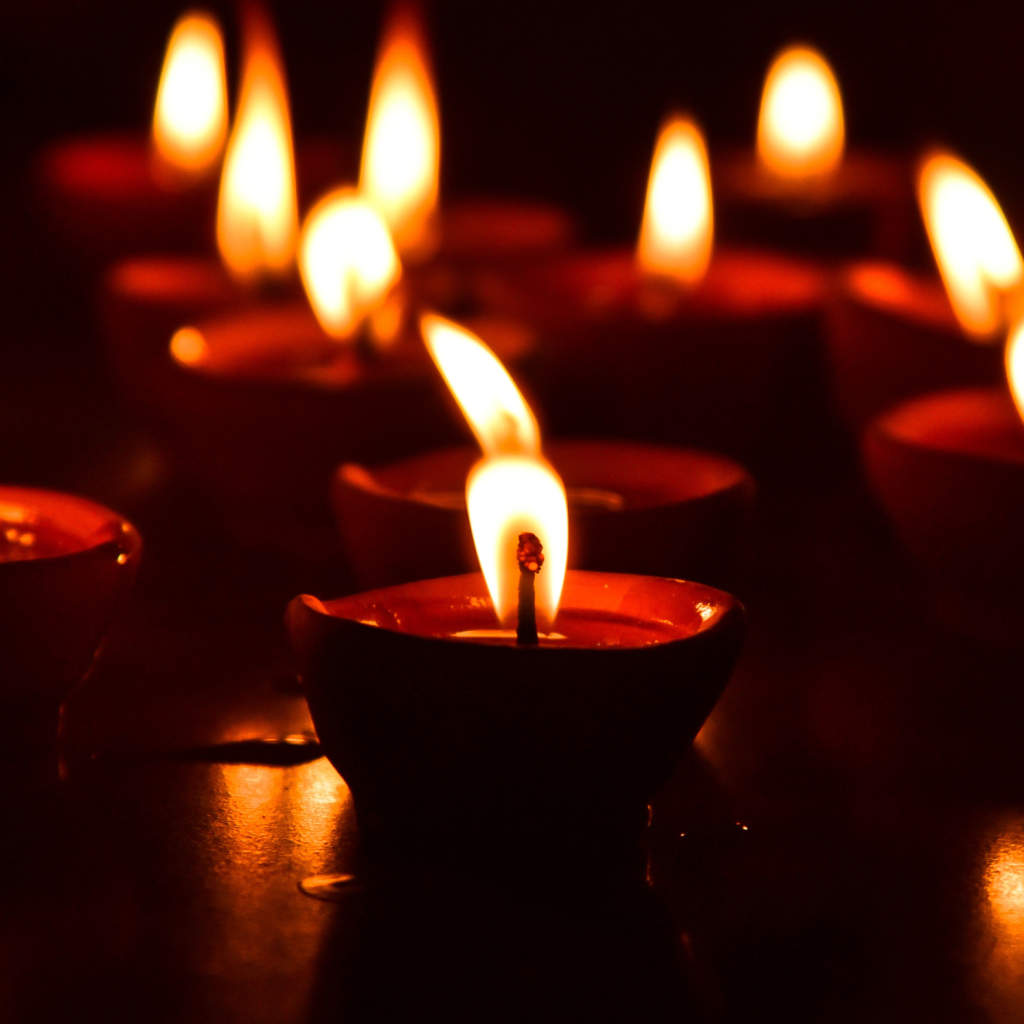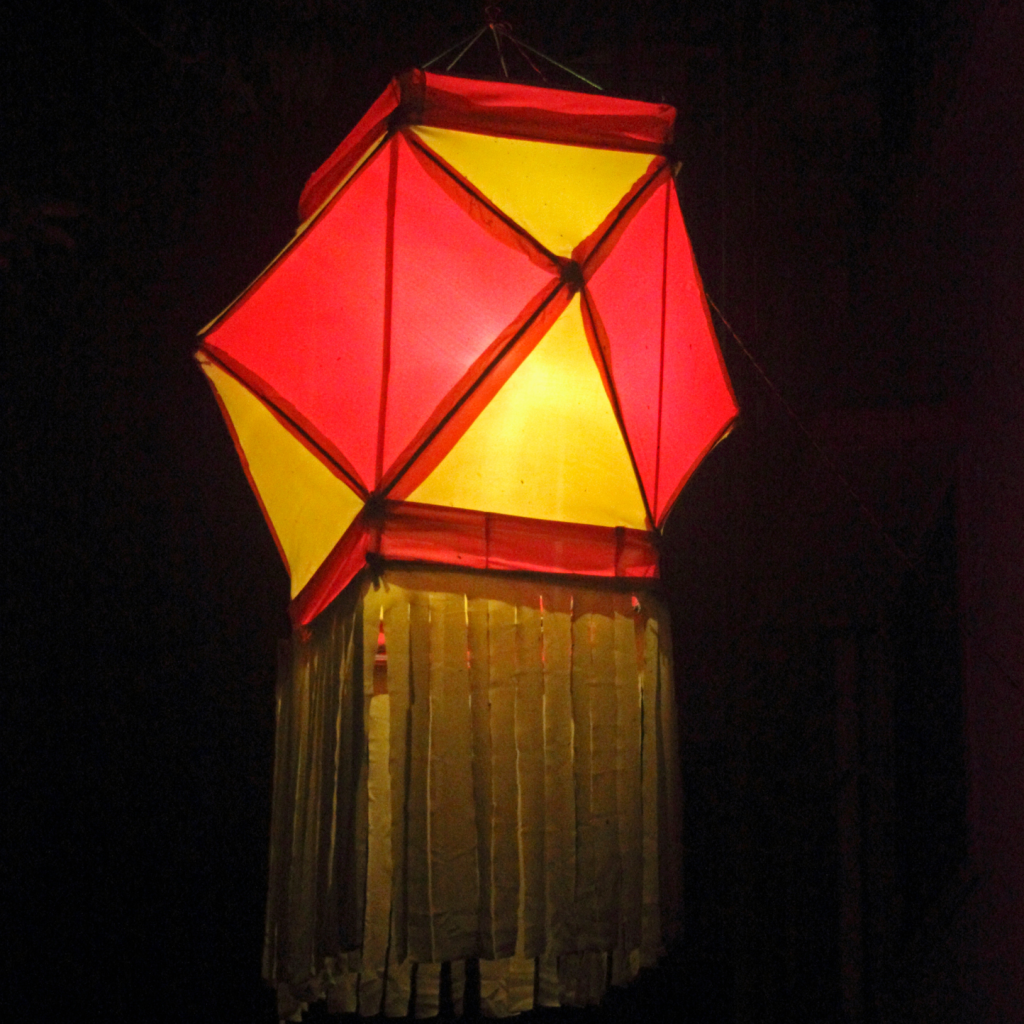There is something resoundingly vibrant about festivals at home, each characterised with its own unique celebration and its own quotient of enthusiasm and fervour. And while the calendar marks every month with reasons to celebrate, the one festival I look forward to the most has always been that spectacular one of lights, Diwali. Its near-week long round of festivities is underpinned by many mythological stories, stories that I learnt from my mother and grandmother, my young eyes widening as I absorbed their import, thrilling at the touch of miracle and magic that bolstered the forces of good as they vanquished evil, convinced that good would always thus prevail and until it did the story couldn’t end. Of course, I grew up and most of that innocent unquestioning belief withered under the onslaught of adult cynicism, but the nostalgia remains as does a fragile hope that good may prevail again. And now my Diwali goes beyond that, beyond the triumphant return of Ram to his rightful throne, the obliteration of the evil asuras that tormented mankind, or even the supplication to Lakshmi to bless all with abiding prosperity. For me, it is at its heart a thing of exquisite beauty, of joy and splendour, of families gathering together, of a sense of solidarity with community, of a baton of tradition passed from our elders to us, a baton we hope will be picked up by our young.
I remember my mother, Aai, waking us children much before the sun rose on Diwali day, Narakchaturdashi. It used to be densely dark outside, we would grumble in protest at surrendering the cosy warmth of our beds, reluctantly rubbing our eyes to rub out the sleep that was still crowding them, and then gradually waking up enough to be suffused with the excitement that the festival promised. Of course, Aai would be up much before us, getting everything ready. She would warm a small basin of oil and vigorously yet lovingly maalish us all in the ritual of an invigorating massage before the special abhyangasnan bath. And, of course, she would do our aukshan, her silver lamp going round our happy faces, blessing us with all good things for the year to come, for all our lives to follow. I would watch as the light from the lamp matched the light in her smiling, loving eyes and ask myself: who does her aukshan?
Duly bathed and dressed in new clothes before the celestial orange tinged the skies, we would partake of our pharaal, the sumptuous Diwali breakfast that had been in the making for several days. Aai and our old reliable, Sudhir, slaving in the kitchen frying mammoth batches of crisp and spicy chaklis and shev, golden sweet shankarpale. Scraping heaps of coconut that filled the most delectable karanjis, some of that fresh coconut roasted with semolina for her scrumptiously melt-in-the-mouth ladoos. On and on they would work, tirelessly, almost endlessly. All this along with cleaning rooms and cupboards, kitchen and pantry and storerooms. Sprucing up the terrace and lending a fresh coat of geru paint to the pots in the garden. Stitching our new dresses having first sourced the material from the few textile shops in the market of the small town we lived in. Getting the essentials for the Lakshmi pooja ready, earnestly polishing the silverware that would be used, assembling the rice flakes and battasas, piling platters with five varieties of fruits, stringing marigold and mango leaves into long wreaths that would dress the deity and go up as toran, the bunting on the doorway, going down on her haunches to make the rangoli that would welcome the goddess. The jobs were many, but her enthusiasm made light of them all.
Aai was exceptionally house proud, every little thing had to be just so, the furniture placed correctly and always dusted spotless, flowers arranged to perfection, the choice of music appropriate for the occasion. Bismillah Khan’s shehnai would always accompany our Diwali celebration. Even today, so many decades later, I still play the same shehnai recordings, a Lalit or a Todi to bring in my Diwali Pahaat, and every single time those majestically melodious strains play they bring tears to my eyes, remembering how it was back then, missing her, missing my father, missing Sudhir, missing how we all used to be together, all close and tight.
The week before Diwali, Dada, our father, would take us shopping for firecrackers. I would empty my school satchel at home and then fill it up with the most glorious anaars and chakris and sparklers and rockets and bombs. Toy guns that were loaded with rolled up strips that went phut–phut with every pull of the trigger. In the afternoon when Aai would catch a shuteye I would be out in the garden blazing my gun about. If the gun stopped working, I would extract the strips, lay them out flat and then bash them with a stone, determined to get every ounce of patakha pleasure. Aai, irritated with these noisy intrusions in her nap, would chase me off. I would sulk a little and then after a grudging lull of a few minutes slink back to the phut–phut, Aai shrugging off her rest, indulging my compulsive festival fever.
My older sisters would build a Diwali killa, a miniature mud and brick fort replete with ramparts and towers and moat, a well too somewhere in the middle. Then they would plant mustard seeds all around and watch with glee as they sprouted green the next morning. Place little clay dolls of Shivaji’s soldiers, maawle as they were called, village women in colourful nine-yard sarees, gawlan, and the Maharaj himself on top seated on his throne. Arms caked with mud right up to their elbows they would spend entire afternoons getting every little detail correct. And as the Diwali diyas were lit all through and around the house, some made their way to the killa too, lighting up not only our happy present but also our glorious past. All resplendent and shining.
I close my eyes and see it all as if it were just yesterday. My father returning home from work on Dhanteras, bowing in salutation to the lamp that had been lit outside facing south in honour of Yamdev. Getting ready the colourful paper lantern, akash kandil, hoisting it up at the front of our house, lowering an electric bulb into it, and then voila! He would let there be light! Helping Aai with her preps, scolding us for not helping her enough. Inviting the juniors in his department for our Diwali breakfast, as also our non-Hindu and non-Maharashtrian friends and neighbours, explaining how we do things according to our Marathi custom. Gifting Aai with a special saree on the Pratipada, the first day of the new month, and then proclaiming that the puranpolis she had made for lunch were, as every year, the best of the century!
I remember our cousins from Mumbai had once travelled to our far-off Jamshedpur for the Diwali holidays. Oh, the fun we all had together! Playing interminable rounds of cards while Aai and Dada succumbed to the soporific effects of the feast. Squabbling with energy but always in good spirit. Emptying the tall bottles that lay wasting around the house, packing sand within, and readying them for the rockets to take-off from, shooting up high and exploding in magnificent kaleidoscopic showers at night. I remember my cousin scurrying back to safety after he had hesitantly lit one, my sister scoffing, and then lighting hers with confident aplomb! I would gape in admiration and then emulate her. Then we sisters would shake our heads and giggle at the timidity of the boys.
Every year my parents gave us a Diwali to remember. And they did it all on a strict budget. Today we probably have more resources than they did, but we don’t do as much. Yes, we clean, decorate, shop, cook, invite, host, gift, and all of that, but with many short cuts and some purely symbolic gestures. A lot gets ordered in, guests are fewer, there are electric lights along with the terracotta diyas, and the polluting firecrackers are a strict no-no.
But it’s such joy to look outside and see the rows of Diwali lanterns dancing all through the lanes, multi-coloured beacons of hope and cheer for all to gravitate towards. That sense of community is precious, of belonging, of shared cheer and bonhomie in the good times, supportive solidarity in the not-so-good.
This year my husband and I celebrated Diwali with our daughter and her family in the US. While we decorated the house, lit all the diyas, hoisted our akash kandil, enjoyed our pharaal, I felt as though we were perched on an island in a sea of people with different affinities, for whom Diwali was merely one of the exotic things that some migrants did. I stepped out to admire our lantern and lights and toran of marigold, and my heart filled with pleasure that we could honour our tradition wherever we may be. But looking around, I felt the indifferent darkness in the neighbourhood, men and women walking their dogs or doing grocery runs or anything much the usual, all dressed in their everyday clothes, looking quizzically at us while we stood about in our dazzling finery. I sighed but returned happily to the buzz of excitement inside. Our son-in-law playing with the baby, she gurgling merrily, while our daughter put finishing touches to the elaborate array of dishes in the kitchen. And I reminded myself: my Diwali is about family, revelling in our togetherness however transient or brief it may be, taking a step back from the press of everyday life to celebrate who we are, our own ethnic roots, our history and our tradition, our long line of ancestors, all those who taught us what this festival is about. And while nothing compares to Diwali at home, we empty nesters look forward to flying out to our young whenever we can and together lighting up our souls in joy. May that light shine on.



Very detailed and nicely written. It reminds me of my childhood days – the Deepawali holidays, the special oil preparation for abhyangasnan, the special homemade sweets, marigold garlands around all water sources at home and the well worship. 🙂
Golden nostalgia!
Thank you!
Ah!! All the memories come flooding back with every line you pen. A perfectly described Diwali of our Jamshedpur days, of a childhood that we were so so privileged to have.
Beautifully written as always
Thank you, Deepa!
Dear Rohini ,Your article regarding traditional celebrations in Dipawali days is very interesting- it strongly reminded me of my childhood Diwali days ! Jayashree Firodia
Sent from Yahoo Mail for iPhone